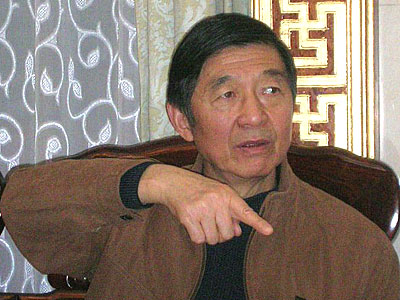
"The year 2007 will probably make history as the year of climate change, and energy-saving will be the most fashionable lifestyle in the future," said Wu Jianmin, President of China Foreign Affairs University (CFAU), at the university's 51st forum held in Beijing on December 5. Excerpts from his speech:
The issue of climate change, originally in the field of natural science, has now become the hottest topic globally. It was the core topic of discussion at various international meetings this year such as the European Council Conference, Asia Pacific Economic Cooperation (APEC) Summit, the United Nations Climate Change High-level Meeting, and the United Nations Framework Convention on Climate Change (UNFCCC) being held currently in Bali, Indonesia until December 14. Moreover, the Saving the Earth concert that kicked off simultaneously in different cities all over the world in July reached 2 billion audiences.
There will be huge problems that result from climate change. Take China as an example. According to the data released by the State Oceanic Administration of China, the sea level around China has risen 9 cm on average during the past three decades; even worse, this figure in Tianjin is 20 cm. The risk of coastal cities being submerged is rising drastically. Hence, man's shared challenges such as climate change and pollution will be more severe. These problems, however, cannot be addressed by one country alone, but by the international community as a whole; people around the world should join hands to face the problems.
China's contribution to fighting global climate change started as early as some twenty years ago. The Intergovernmental Panel on Climate Change (IPCC) is an organization set up by the World Meteorological Organization (WMO) and the United Nations Environment Program (UNEP) in 1988. It provides the decision-makers and others interested in climate change with an objective source of information on the subject. So far, China has sent more than one hundred scientists to the IPCC since its establishment.
A UN report released in Paris in February includes the strongest warning yet to us: we humans are stoking global warming, which may cause colossal damage to nature if we ignore rising temperatures. The report, made by 2,500 scientists, say there is at least a 90 percent chance that human activities -- especially fossil fuel burning -- are the main cause of global warming in the past 50 years, which may cause more floods, heat waves, droughts and rising sea levels by 2100.
Qin Dahe, who serves at the IPCC and is President of the China Meteorological Administration, will share this year's Nobel Peace Prize with his colleagues as well as Al Gore, the former Vice President of the United States, for their contributions towards fighting global climate change. This is recognition for a Chinese scientist as well as the Chinese science circle. The whole nation will be proud of it.
Man should spare no efforts in changing his current energy-consuming lifestyle, since the Earth is being overloaded. From an individual perspective, energy-saving lifestyles -- the traditional virtue of Chinese nation -- should be restored and promoted as best as we can; it will probably become a new fashion trend in the foreseeable future. After all, the materials on the Earth are limited. Chinese people should think about this seriously. For example, non-recyclable chopsticks should be totally banned in all restaurants nationwide. More importantly, the world will benefit if everyone contributes a little to fighting climate change.
There is a phenomenon that's worth praising. The forest areas in China have been increasing continuously even as the rest of the world suffers from a decrease. China ranks the world number one in forest protection. Currently, the total forest area in China is 175 million hectares, an increase of 18.21 percent from some 60 years ago. The forest coverage area will expand to 20 percent or above by 2010, according to the government's plan.
In addition, the idea of changing the economic growth model from an extensive one to energy-saving and efficient ways, as proposed by the government, is promising. There will be much more space for the development of a low-carbon-consuming industry and eco-friendly energy.
Background information of the CFAU Forum
Initiated by Wu Jianmin in September 2003, the monthly (or sometimes weekly) forum invites speakers ranging from high-level political officials home and abroad, senior officers in foreign affairs, to top academicians in social and natural sciences. The 51st edition was hosted by Professor Qin Yaqing, Executive Vice President of CFAU. Invited speakers included Wu Jianmin, President of CFAU; Professor Yu Xintian, head of the Shanghai Institute for International Studies; and Wang Yizhou, fellow researcher at the World Economic and Political Studies Institute of the Chinese Academy of Social Sciences. | 